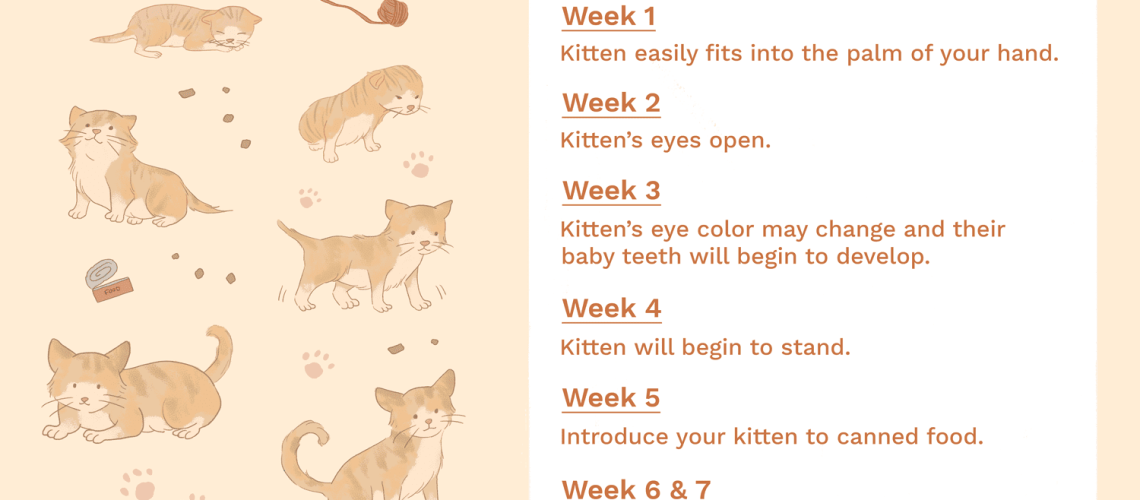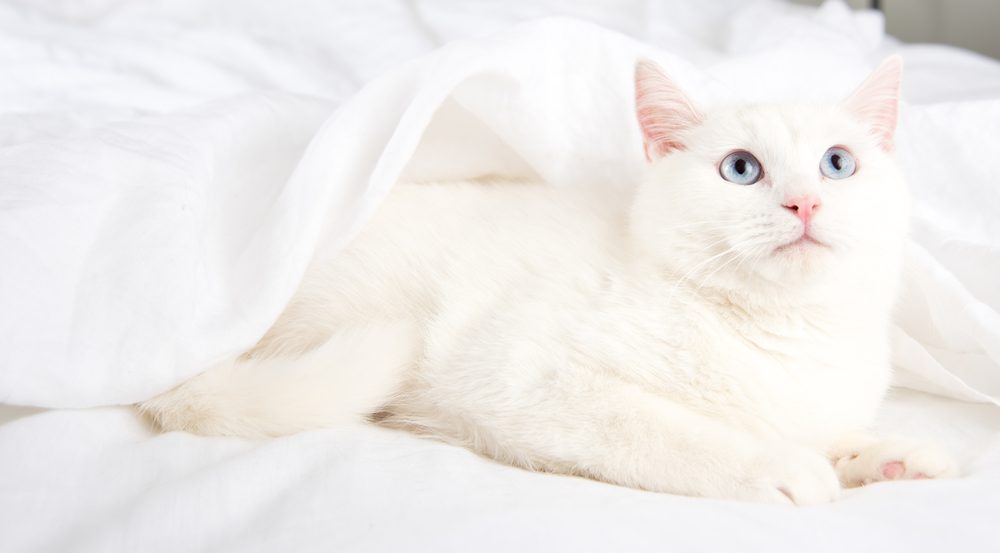Are you a proud new kitten owner? Congratulations! You've embarked on an incredible journey filled with love, joy, and endless cuddles. But did you know that the first six weeks of your kitten's life are crucial for their development?
Understanding this topic will not only help you provide the best care for your furry friend but also strengthen the bond between you two. So, let's dive into the fascinating world of your kitten's development in their early weeks and uncover the secrets to raising a happy and healthy feline companion. Get ready to be amazed by the wonders of nature as we explore this captivating subject together. Let's begin!
Key Takeaways:
- Kittens develop rapidly in the first six weeks, undergoing significant physical and cognitive changes.
- During this period, kittens rely heavily on their mother for nourishment, warmth, and socialization.
- From two to three weeks old, kittens start exploring their surroundings and developing basic motor skills.
- Between four to six weeks old, kittens begin weaning off their mother's milk and transitioning to solid food.
- Socialization with humans and other animals is crucial during this time to ensure proper development of a kitten's social skills and behavior.
Understanding a Kitten's Development in the First Six Weeks
A Time of Rapid Growth and Development
During the first six weeks of a kitten's life, they undergo significant growth and development. At birth, kittens are tiny and helpless, weighing only a few ounces. However, in just a matter of weeks, they will double or even triple their weight! Their bodies become more coordinated, and their senses start to sharpen.
Kittens also begin to develop their personalities during this time. Some may be more adventurous and curious, while others may be more timid and cautious. It is important to provide them with a safe and nurturing environment to support their growth.
The Importance of Socialization
Socialization is crucial for kittens during the first six weeks of their lives. This is when they learn how to interact with other cats and humans. A well-socialized kitten will grow up to be a friendly and confident adult cat.
During this period, it is essential to expose them to different people, sounds, and experiences. Handling them gently and frequently will help them become comfortable being touched and held by humans. Introducing them to other cats or friendly dogs can also aid in their social development.
Important Milestones in a Kitten's Growth During the First Six Weeks
The Opening of Eyes
One of the most exciting milestones in a kitten's growth is when they open their eyes for the first time. Around two weeks old, their eyelids will start to part, revealing beautiful little eyes underneath. Initially, their vision may be blurry as they adjust to the world around them.
By three weeks old, most kittens' eyes are fully open, allowing them to explore their surroundings with clearer vision. It's a magical moment to witness their curiosity as they begin to take in the world around them.
Teeth Eruption
Between three and four weeks old, kittens start getting their baby teeth. These tiny, needle-like teeth will gradually replace their milk teeth as they grow. The teething process can be uncomfortable for kittens, causing them to chew on objects or even their littermates for relief.
Providing appropriate chew toys can help alleviate discomfort and prevent them from damaging furniture or biting excessively. Soft rubber toys or specially designed kitten teething toys are great options.
The Role of a Mother Cat in Nourishing and Caring for Kittens
Milk Production and Nursing
A mother cat, also known as a queen, plays a vital role in nourishing her kittens during the first six weeks of their lives. She produces milk that is specifically designed to meet all their nutritional needs. The milk provides essential antibodies that boost the kittens' immune systems and protect them from diseases.
The queen will nurse her kittens multiple times a day, ensuring they receive enough food and hydration. As the kittens grow older, they may start exploring solid food alongside nursing until eventually weaning off completely by around six weeks old.
Grooming and Socialization
In addition to providing nutrition, mother cats also groom their kittens regularly. Grooming helps keep the kittens clean by removing dirt and stimulating blood circulation. It also strengthens the bond between the mother cat and her offspring.
During grooming sessions, the mother cat licks her kittens all over their bodies. This not only keeps them clean but also helps stimulate bowel movements. In this way, she assists in training them on how to use the litter box properly.
Signs of a Kitten's Increasing Independence and Exploration
Wandering Away from the Nest
As kittens grow older, they become more curious and adventurous. Around four weeks old, you may notice them venturing away from their nest or designated area to explore their surroundings. They may start to climb, jump, and play with toys or their littermates.
This exploratory behavior is a positive sign of their increasing independence and confidence. However, it's important to ensure that the environment is safe for them to explore without any potential hazards.
Increased Vocalization
Kittens begin vocalizing more as they grow older. They may start meowing or purring to communicate their needs or desires. Their vocalizations can vary in tone and intensity, conveying different messages such as hunger, discomfort, or playfulness.
By paying attention to these vocal cues, you can better understand your kitten's needs and respond accordingly. It is an exciting time as you learn to decipher their unique language and build a stronger bond with your furry friend.
When Do Kittens Start Eating Solid Food and Why is it Important?
The Introduction of Solid Food
Around three to four weeks old, kittens will begin showing interest in solid food. You can introduce them to a specially formulated kitten food moistened with water or kitten milk replacement formula. Initially, they may only nibble on the food but gradually increase their intake over time.
The transition from milk to solid food is essential for their growth and development. It provides additional nutrients necessary for building strong muscles and bones. It also helps stimulate proper jaw alignment and dental health as they chew on the solid pieces of food.
The Weaning Process
Weaning is the gradual process of transitioning kittens from their mother's milk to solid food. It usually takes place between four to six weeks old. During this time, the mother cat will start reducing her nursing sessions, and the kittens will rely more on solid food for nutrition.
It's important to monitor their progress during the weaning process and ensure they are eating enough to meet their nutritional needs. If necessary, consult with a veterinarian for guidance on proper feeding schedules and appropriate kitten food choices.
The Importance of Playtime in a Kitten's Development and How to Encourage It
The Benefits of Play
Playtime is not just fun for kittens; it also plays a crucial role in their development. Through play, kittens learn important skills such as coordination, balance, and hunting techniques. It helps them develop strong muscles and promotes mental stimulation.
Regular play sessions also provide an opportunity for bonding between you and your kitten. It builds trust and strengthens your relationship as you engage in interactive play together.
Choosing Appropriate Toys
- Balls or small toys that can be batted around
- Feather wands or fishing rod toys for chasing and pouncing
- Catnip-filled toys for added excitement
- Puzzle toys that dispense treats to stimulate problem-solving skills
When selecting toys for your kitten, make sure they are safe and suitable for their age. Avoid small objects that could be swallowed or pose a choking hazard. Interactive toys that mimic prey-like movements are particularly engaging for kittens.
Promoting Proper Socialization for Well-Adjusted Adult Cats
Early Exposure to Different Environments
During the first six weeks of a kitten's life, it is crucial to expose them to various environments and experiences. This helps them become accustomed to different sights, sounds, and smells, reducing the likelihood of fear or anxiety in new situations as they grow older.
You can gradually introduce your kitten to different rooms in your home, other pets (if safe), and even take them for short car rides. The more positive experiences they have during this critical period, the more confident and well-adjusted they will be as adult cats.
Positive Reinforcement Training
Positive reinforcement training is an effective way to socialize kittens and shape their behavior. Rewarding desired behaviors with treats or praise encourages them to repeat those behaviors in the future.
For example, when your kitten approaches you calmly or uses the litter box correctly, reward them with a small treat or gentle petting. This reinforces positive associations and helps them understand what behaviors are desirable.
In conclusion, during the first six weeks of your kitten's life, it undergoes significant growth and development. From opening its eyes to learning how to play and explore, these early weeks are crucial for building a strong foundation for a healthy and happy cat.
What to expect from a 6 week old kitten?
Kittens at this stage are able to run and are highly energetic and playful. While they are transitioning to being more independent and can eat solid food, they may still nurse from their mother and seek comfort from her.
Can 6 week old kittens poop on their own?
By the time kittens reach 3-4 weeks old, they are typically able to independently eliminate waste. This includes both urination and bowel movements, as well as using a litter box. However, if a kitten is younger than 3 weeks old and orphaned, it may require assistance in defecating by using a warm wet cloth for stimulation.
What age do kittens start purring?
According to Catster, newborn kittens are capable of making sounds and often make little mews to communicate their hunger to their mother. They typically start purring around week three and become more vocal as they develop the ability to walk, play, and explore their surroundings.
Can 6 week old kittens see?
At six weeks old, kittens have fully developed and focused eyes. They begin to venture out and explore short distances. During this time, they also start to interact with their siblings and mother, practicing skills such as pouncing and playing.
Do 6 week old kittens drink water?
Do kittens consume water? While kittens primarily drink their mother's milk until they are weaned at around four weeks old, they still require water. After being weaned, most kittens struggle to digest milk sugar effectively, making water their main source of hydration.
How often should I feed a 6 week old kitten?
A six-week-old kitten should be fed four to five times daily because their stomachs are small and cannot handle large amounts of food in one meal. Make sure to buy kitten-specific food for a six-week-old kitten.

















